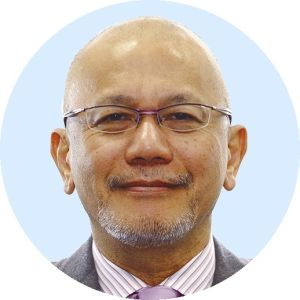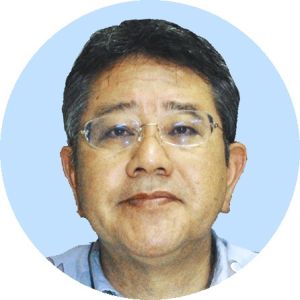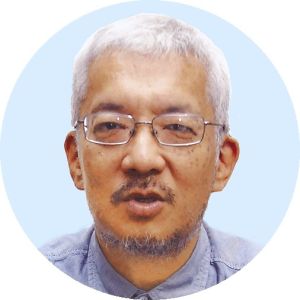The commentaries on Gov. Onaga’s visit to the U.S.
The military that threatens the dignity of women
 Harumi Miyagi, historian on women’s issues in Okinawa
Harumi Miyagi, historian on women’s issues in Okinawa
About 15 years ago, I had the opportunity to speak about U.S. military base issues in Okinawa to a group of American students in Washington DC. One of the students said, “The U.S. forces are stationed there to protect the Japanese. There is no way that the military has caused troubles. Rather, the Japanese have done terrible things to the Asians. The issue of ‘comfort women’ has not been resolved yet also.” Other students raised a similar voice.
Once again, I’d like to state the following.
First of all, please acknowledge the fact that the armed forces of your country have continued to stay in Okinawa for 70 years and have caused a countless number of incidents and accidents. The U.S. military has looked down upon the local Okinawans as “gooks (Asians)” and has been allowed to do whatever they want in Okinawa, which they regard as their war trophy.
Since the armed forces landed on Okinawa in 1945, a countless number of women, including a nine-month old infant, have been deprived of their human dignity at the demonic hands of your military. Furthermore, most perpetrators have continued to lead a normal life without being punished for their acts. For women, Okinawa is not yet in a “post-war” era as long as the armed forces of your country continue to be stationed on the island.
The Pentagon said on May 1 that an estimated 18,900 service members were subjected to some kind of unwanted sexual contact in fiscal 2014. The residents of Okinawa know that it is a structural problem with the military, that the stress of continuing to train for killing people will find an outlet on the weak members of society.
For sure, the historical recognition of the Japanese government is also unacceptable to the Okinawans, who have experienced the Battle of Okinawa firsthand. But please note that many members of Japanese civic groups have been working with the people of Asia to expose aggressions committed by the imperial Japanese military and have been continuing movements to teach accurate history. To the citizens of the United States, I urge you not to be swayed by the government’s policies, but instead, recognize how much your armed forces are detested by residents of other countries and start a movement to bring the military stationed in Okinawa back to your own country.
Canceling construction of a new base is not unreasonable
 Masaaki Gabe, professor at the University of the Ryukyus
Masaaki Gabe, professor at the University of the Ryukyus
It is a reasonable decision for the U.S. Government to cancel construction of the new base at Henoko, Nago. The Okinawan people have adamantly rejected the relocation plan and so the United States should encourage the Japanese government to give up its construction plan.
The main purpose of Governor Takeshi Onaga’s visit to the United States is to gain more understanding about Okinawa by explaining Okinawa’s current situation 70 years after world war II from the standpoints of rights and justice. The governor’s claim is not contrary to the interests and principles of the United States.
The Majority of Okinawan people do not think it is still necessary to maintain giant U.S. military bases. They think it is possible to realize a large-scale reductions of the U.S. Marine s in Okinawa.
During the 20th century, the United States had extraordinary military power and mobility, which made it easy to deploy its forces outside U.S. mainland. With the growth of China’s military after 2010, Okinawa is within the range of China’s short and long-range missiles.
U.S. military ground installations have become the potential target of Chinese missiles. The United States is losing its superiority in its capability to deploy forces – its superiority is limited.
The need for land-based U.S. Marines has becomes less necessary. China’s military capability on and below the sea is a threat to the U.S. aircraft carrier group. The first priority for the U.S. forces is to develop its ability to pursue Chinese submarines.
It is paramount importance for the United States to avoid an armed conflict with China in the South China Sea and the East China Sea. If an armed conflict were to occur, it would be helpful for the United States to pursue a diplomatic solution to tensions, while taking measures to prevent an escalation of the conflict. With particular regard to involving China in the region, the U.S. Marines are not expected to play a significant role. It would be sufficient to deploy at most 100 personnel to inspect unidentified ships.
The possibility that an armed conflict could break out between Japan and China is more likely than between the United States and China in a territorial dispute over the Senkaku Islands. If that were to happen, the United States should play the role of easing tensions. Even after moving the Marines to Guam and Hawaii, the sprawling Kadena base will remain in Okinawa.
The U.S. hedge strategy to manage potential threats from China would be most effective by using the U.S. Naval forces home-based in Japan and its air forces at Kadena Air Base.
Gov. Onaga should exercise Okinawa’s right to self-determination
 Jun Shimabukuro, professor at the University of the Ryukyus
Jun Shimabukuro, professor at the University of the Ryukyus
Governor Takeshi Onaga will urge the United States to stop building the new base in Henoko and allow Okinawans to exercise their right to self-determination. In response to the action to be taken by Governor Onaga, these are some of the key stances of the U.S. government;
(1)The governments of Japan and the United States will go ahead with the plans involving U.S. base in Okinawa by their negotiations on the agreement between them. (They allege that Okinawa has not the right to negotiate with the U.S. government about anything regarding the relocation plan.)
(2) The U.S. government says it is prepared to consider alternative proposals from the Japanese government regarding the realignment of U.S. forces in Japan, including the Henoko plan. (The U.S. government is fully aware that Japan will not offer alternative solutions because Japan is a “vassal state of the U.S.”)
(3) The U.S. government has received the explanation from the Japanese government regarding this matter, that the work in Henoko is carried out legally, based on appropriate procedure, including the former governor’s approval of the landfill. (The U.S. government has no doubts the procedure was just formality and went far beyond practical reign of law.)
The U.S. government is expected to tell Governor Onaga that the Henoko base was given the go ahead after the Okinawan administration approved the landfill, and regarding domestic politics, including the political process that led to the former governor’s approval, it will urge Onaga to appeal to the Japanese government rather than the U.S. government. It will stress that negotiation must go through the Japanese government, not directly between Okinawa and the U.S. government.
However, the U.S. government and U.S. residents must learn that Okinawa-U.S. relations have a long history.
The United States made a pact with Okinawa when the prefecture was its own independent kingdom, the Ryukyu Dynasty. Following the battle of Okinawa, the U.S. took over administration of Ryukyu from the Japanese government. Okinawa has a right to self-determination under international human rights law, certified by the United Nations. Thus it is illegal for the U.S. and Japan to exclude Okinawa from decisions about its future. The US government must recognize Okinawa’s rights and the Japanese government should make proposals to the U.S. government only after it has had proper democratic discussions and agreements with Okinawa. They must respect Okinawan public opinion. Finally, it must be known that the former Okinawan Governor approved the landfill in a total betrayal of his election campaign pledge, and of the Okinawan people. The former governor failed to win support in the following election, in which the Henoko relocation was the key issue for voters. The Okinawan public has demonstrated its democratic will, which is to stop Henoko. The former Governor’s approval of the Henoko relocation violated Okinawa’s right to self-determination.
Okinawa is shaking the foundations of the US-Japan alliance
 Manabu Satou ,Professor at the Okinawa international university
Manabu Satou ,Professor at the Okinawa international university
Last November, in a gubernatorial election that was widely viewed as a referendum on the construction of a new US Marine Corps base in Henoko, Okinawans , elected current governor Takeshi Onaga by an overwhelming margin. In December’s Lower House elections, anti-Henoko “All Okinawa” candidates swept all four of Okinawa’s districts, defeating pro-base LDP incumbents. And in Nago city, where Henoko is located, last year’s mayoral and city council elections were won by anti-Henoko candidates. As self-proclaimed champions of democratic ideals, the American people must be informed that Governor Onaga’s plea to stop the construction of the new base at Henoko has clear and overwhelming democratic legitimacy- it is his electoral mandate. To ignore the popular will of the Okinawan people and push forward the construction by force will definitely and irreparably damage the US’s moral standing in international society.
It seems that both President Obama and Congress have welcomed Prime Minister Abe’s policy offerings, such as widely expanding the role of Japan’s Self Defense Forces and pushing forward construction at Henoko, because of the short term relief they would provide the US. But does the US government understand what Japanese society would expect from a new base in Henoko and the continued presence of the US Marine Corps in Okinawa? For the Japanese, a new base at Henoko is seen as a base for direct US military operations against China in the Senkaku Islands. Should the US avoid such a military conflict with China, Japan- and other allies- would drift away from the US. To force the construction of the base at Henoko would force the US into a difficult situation.
Further, Prime Minister Abe seems to have decided that the US accepting his offering of Henoko means that the US also accepts his historical revisionism. The US will end up trading its long-term, post-war status as leader of the free world for the short term and insubstantial advantages that the base at Henoko might bring.
Governor Onaga was an influential member of the LDP and is a conservative politician. Even now, he supports the US-Japan Security Treaty, and only wants to stop the construction of the new base at Henoko. He has continuously accepted the presence Kadena Airbase, which far more important strategically than Henoko or Futenma to the US. Americans should think hard about what it means for such a conservative politician to stand at the forefront of the anti-Henoko movement. Okinawa’s political situation has the very real potential of shaking the foundations of the US-Japan alliance.
Stop the construction of the base at Henoko.
Previous Article:Voices from Okinawa
Next Article:Governor Onaga heads to Washington to seek cancellation of new base
[Similar Articles]
- Gov. Onaga seeks U.S senators’ and representative’s support to block new base
- Governor Onaga to visit to US at end of January, making appeal to incoming administration for Henoko issue
- Governor Onaga says “The new base is discrimination,” and “America is responsible” in appeal to US Ambassador
- Onaga asks US Senate chairperson to listen to Okinawan residents
- Gov. Onaga and Sen. McCain agree to continue dialogue on the Futenma and Henoko issue
 Webcam(Kokusai Street)
Webcam(Kokusai Street)


